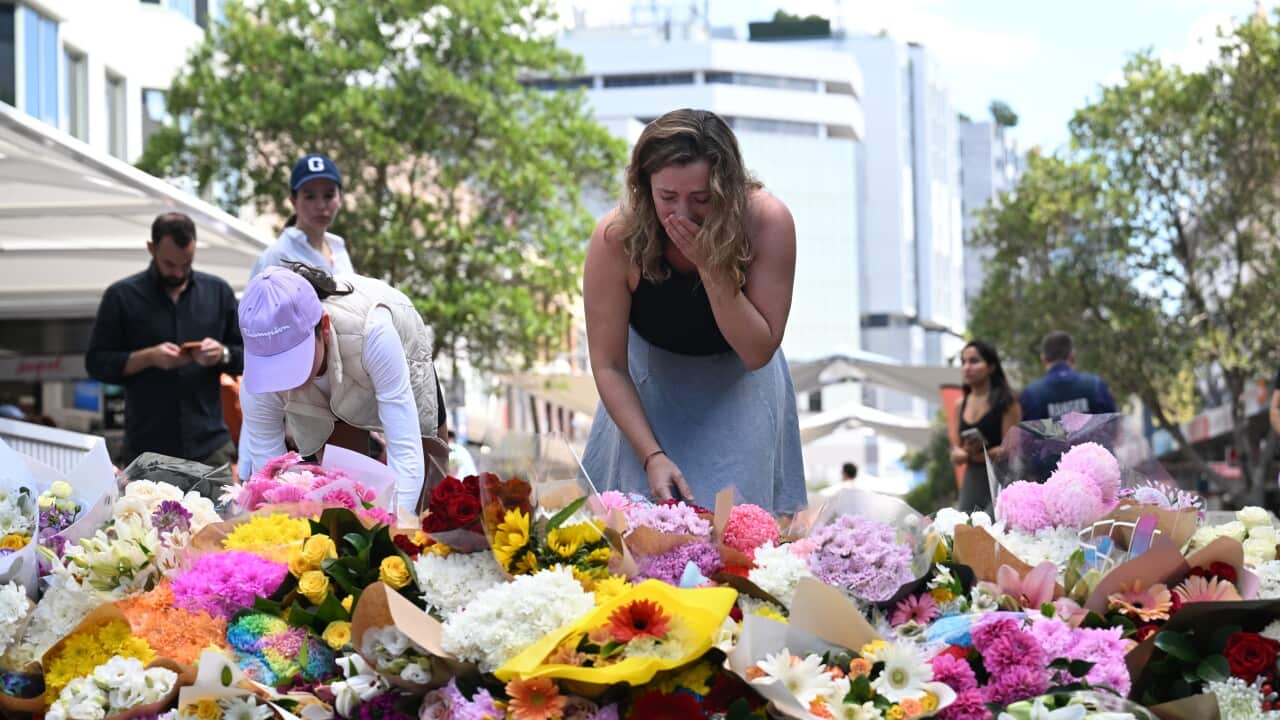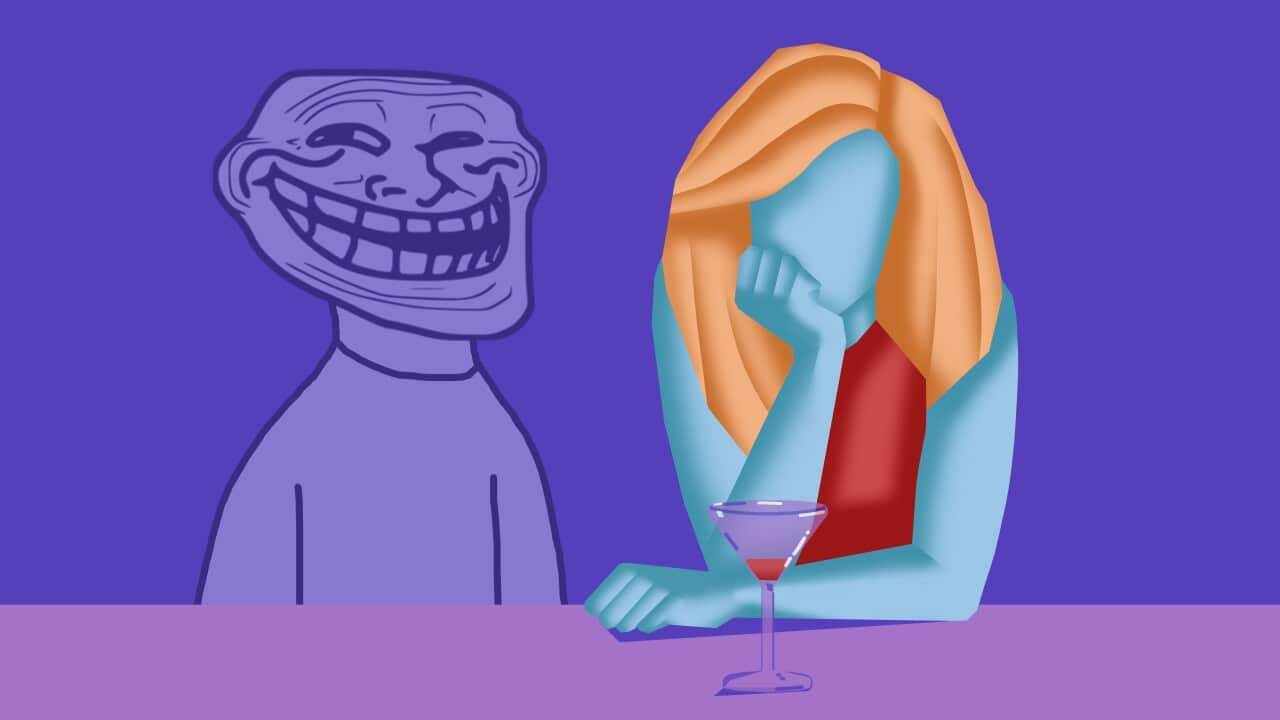"The videos speak for themselves, don't they?" NSW Police Commissioner Karen Webb told the ABC on Monday. It was "obvious" the attacker, Joel Cauchi, targeted the women and "avoided the men", she said.
In the Bondi Junction shopping centre attack, five of the six people killed, and nine of the 12 people injured, were women.
When Cauchi's father was asked by reporters why his son might have targeted women, he said it could have been out of frustration.
"He wanted a girlfriend, and he’s got no social skills, and he was frustrated out of his brains," the father said.
In Australia, 834 women have been violently killed since 2012
Less than 24 hours before the Bondi stabbings, hundreds of residents in Ballarat were protesting against the deaths of three local women and calling for more action on gendered violence.

Members of the Ballarat community rally against men's violence following the alleged murder of three women in the regional Victorian city in the past three months. Source: AAP / Con Chronis
From 2012 to 2021, (recent years have not yet been recorded) the Global Terrorism Database attributed 14 people killed from terrorism in Australia, including victims and attackers.
Two days after 40-year-old Cauchi attacked shoppers in Bondi Junction, a 16-year-old boy allegedly stabbed a bishop and priest at a western Sydney church. No one was killed in that attack.
Within hours of the attack, NSW Police said it was being regarded as a "terrorist incident", with Webb explaining the designation gave police extra investigative powers, including being able to stop and search people without a warrant for up to 14 days.
Police are still investigating the potential motivations of the Bondi Junction attacker. They have also said the attacker had a history of mental illness.
But the stabbings and their classifications have drawn questions and criticisms on how Australia classifies terrorism.
Why the Bondi stabbing wasn't classified as terrorism
In an interview with SBS News on Thursday, Prime Minister Anthony Albanese rejected the accusation the "terrorism label" was being "used selectively".
Albanese said it was not the role of politicians to "define these things".
"My job as prime minister is to give every support to the police and to the security agencies, and that is precisely what I'm doing," he said.
Terrorism in Commonwealth law is defined as an act or threat that is intended to "advance a political, ideological or religious cause" and "coerce or intimidate an Australian or foreign government or the public".
Shannon Zimmerman, a counter-terrorism expert and lecturer from Deakin University who focuses on misogyny-based violence, argues that "male supremacy" is an ideology.
But she said there is not enough evidence to establish that Cauchi's attack was to advance a cause or intimidate.
"We'd have to establish some kind of group connection to a broader group of broader ideology."
Zimmerman said some commentary she has read has pushed back on the need to establish an intention to coerce and intimidate, saying even without it, the attack has had the same consequence.
To that, she said: "I can't argue with that logic."
"It's terrorised women, it's made them afraid — even if their individual intent wasn't to do so."

Violence support lines 1800RESPECT and Full Stop Australia have reported spikes in callers since the Bondi attack. Source: AFP / David Gray via Getty Images
Within a day, the Bondi stabbings were deemed not to be terror-related — a short time frame that left Zimmerman a little stunned.
"If this attack was focused on any other group, this classification would've been considered ideological [or] at least considered for longer rather than immediately saying, 'well, it's just women'," she said.

Ashlee Good (left) and Dawn Singleton were both killed in the Bondi stabbing attack on Saturday. Source: Supplied, AAP
'Terrorism used as a tactic in targeted violence'
Professor Debra Smith, an extremism expert at Victoria University, said terrorism is a tactic used by people whether they’re affiliated with a political, religious or ideological cause, or not — and it's important to recognise the overlap.
She said targeted violence, as opposed to terrorism, is more about someone feeling wronged by a specific person or a specific group of people.
"[Targeted violence] tends to be less influenced by the current social and political climate and more by feelings of being wronged by a specific person or a specific category of people," she said.
"And potentially in Bondi, that category of people are women."
Smith understands why a difference in the classifications and widespread coverage might feel contradictory and minimising — particularly when the threat of being killed by an intimate partner is far more probable than terrorism.
"It's a bit like [how] we know it's more dangerous to be in a car than a plane, but people are more scared of flying," she said.
"Just because something is or isn't classified as terrorism doesn't make it better or worse. Both those incidents, regardless of how they're classified, are horrific."
Zimmerman agrees broadening the classification might not be all helpful here.
"I'm not sure military or heavy police responses to domestic violence would be effective," she said.
"We need to consider much more upstream things like understanding toxic masculinity and where misogyny comes from."
The intersection between mental health and ideology
In a statement, Cauchi's family said he had battled mental health issues since he was a teenager, with reports that he had been diagnosed with schizophrenia.
His parents told reporters on Monday that Cauchi had been in the care of doctors in Queensland for around 18 years but had gradually come off his medication.
The fallback position taken by some, that mental illness is enough to rationalise a violent attack, and can’t intersect with ideology shouldn’t be accepted, said Josh Roose, an associate professor of extremism at Deakin University.
He said the severity of the illness and how much support someone received are important factors, but adds: "It would actually be an attack on mentally ill people to suggest that they're incapable of holding a set of beliefs or principles or values and not demonstrating any agency at all."
"You can be mentally ill and still cognisant and capable of holding a set of beliefs."
A statement by Patty Kinnersly, CEO of the national violence prevention organisation Our Watch, read: "There is further complexity around reports of unmanaged severe mental illness in this incident."
"While we cannot speak directly about the causes or motives for this specific incident, we know that more broadly, evidence does not point to mental illness being a driver of violence against women.
"The evidence consistently shows that the underlying causes of violence directed toward women are rigid gender stereotypes, sexism and disrespect."
Can violent misogyny ever be terrorism?
Misogyny is a common feature in extremist groups, with many spouting a "narrative of male saviours", Zimmerman said. While it is often secondary to the ideology, there are some that centre the entire identity around male supremacy.
"There are a few cases, incels, for example, men going their own way, where misogyny becomes the ideology," said Zimmerman.
"This is male supremacist ideology, and that's the whole core."
This is when it can potentially be classified as terrorism, Zimmerman said.
The 'incel' — short for involuntary celibate — movement has inspired a series of mass killings around the globe.
Last December, a judge in Canada convicted an incel as a terrorist, making it the first-time gender-based violence was labelled terrorism in the country.
In these extreme cases, the "ideology" has very clearly been referenced by the killer or a digital footprint could be traced back to these groups.
There has been no indication that Cauchi was connected to these groups.
People aren't aware they're consuming extreme content
Zimmerman says the online 'manosphere' — a mix of websites, blogs, and online forums promoting masculinity, misogyny, and opposition to feminism — is bleeding out of their typical spaces.
"Moderate groups are getting smaller, and the extreme groups are getting bigger, and you're seeing their discourse proliferate on the internet," she said. Efforts to stamp out extreme pockets of the manosphere have instead spread them wider online, she said.
"What happens is those groups splinter and reform on other websites, and they're actually more extreme on the new websites," she said.
"Often, people hold political views and don't know really where they got it from."
Ultimately, it can’t be denied that online views manifest in the real world, she said.
"Misogyny really puts violence forward as one of the best ways to achieve its objectives because it's a way of reclaiming things that you feel like you've been entitled to and denied to you," she said.
"Where is it coming from? It's all over the internet."
Readers seeking support with mental health can contact Beyond Blue on 1300 22 4636.
More information is available at supports people from culturally and linguistically diverse backgrounds.













